Integrating knowledge about AI, technology
Associate Professor, Dr. Tran Viet Long, Head of Training Department, University of Law (Hue University), commented: "Currently, the application of artificial intelligence in education plays a key role in digital transformation and integration. Universities need to quickly adapt, closely follow the State's guidelines and policies, and include courses on information technology, artificial intelligence, electronic operations management and data digitization in training."
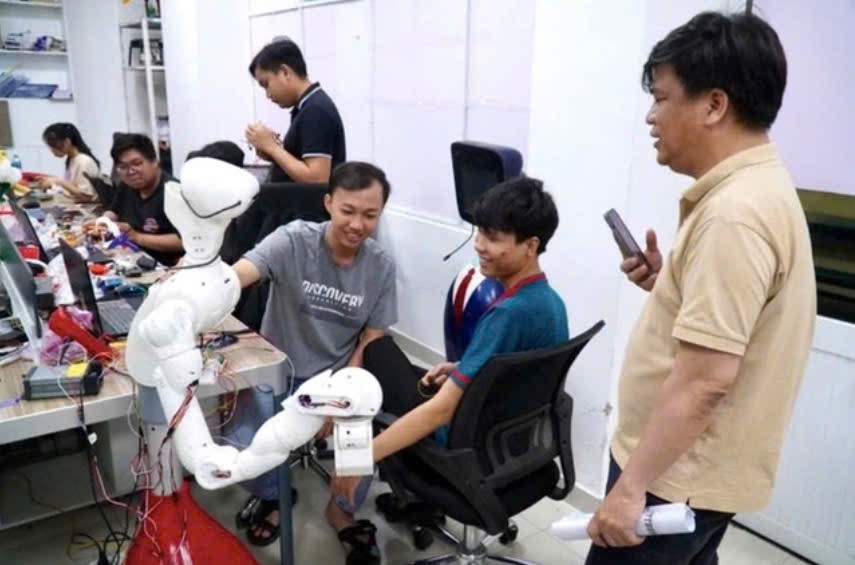
Knowledge and skills in using AI are a must-have for workers in the new era.
PHOTO: MY QUYEN
Accordingly, Associate Professor Dr. Long believes that students need to be equipped with knowledge and skills to exploit and master technology right in school. Training programs must be continuously updated, integrating content on big data, information technology, artificial intelligence, while developing soft skills, critical thinking skills and the ability to apply technology to their careers. This is the foundation for students to master their work, improve their competitiveness and position their personal brand in the digital age.
"The University of Law, Hue University always focuses on reviewing and updating the training program, regularly soliciting opinions from employers, alumni, lecturers, and students, and analyzing labor market trends to adjust the training program to be highly applicable. New, topical courses that combine theory, practical skills, and technology are given priority, especially between law and technology. Students are equipped with the ability to work independently, adapt, and compete in a digital environment," Mr. Long informed.
Dr. Nguyen Van Kha, Deputy Director of the Admissions and Communications Center of Ho Chi Minh City University of Industry and Trade, said that students need to be deeply aware of the huge impact and influence of the technological revolution. "This revolution will create a new driving force to strongly promote the economies of many countries and territories to shift to a knowledge economy, to a "smart" society. AI will be a virtual assistant that replaces part of human work. Therefore, students must proactively update and apply the latest scientific and technological advances in the world to study, work and life," said Dr. Kha.
Along with that, foreign language ability will expand career opportunities for students. In particular, soft skills will be an important factor in determining who you are, how you work, and a measure of high efficiency at work, determining up to 75% of success, while hard skills (knowledge, professional qualifications) only account for 25%.
"Enterprises also require candidates with experience. Therefore, students need to experience their careers while still in university. Internships and practical training with a serious attitude will help them not be surprised after graduating and going to work. On the university side, the training program must always be changed, updated and applied with practical knowledge continuously to suit the changes in technology in the digital age," Dr. Kha shared.
Equip yourself with digital thinking and continuous learning
Dr. Nguyen Trung Nhan, Head of Training Department of Ho Chi Minh City University of Industry, emphasized that the mandatory requirement for workers to be able to adapt and respond in the context of the upcoming labor market is the ability to update new knowledge and skills.
"In recent years, universities have changed their training methods and continuously updated their programs. However, university time is only 4-5 years, while students work for years after graduation. Therefore, universities only provide students with core foundational knowledge; approaches and research methods; basic skills, but when they go to work, they must be able to self-study, proactively update new knowledge and skills to adapt," Dr. Nhan advised.

Students need to be equipped with quick adaptability, analytical skills, digital thinking and an attitude of continuous learning.
Photo: Ha Anh
Master Cao Quang Tu, Director of Admissions at Saigon International University, also believes that specialized knowledge is necessary, but not enough. What students need to equip themselves with more is the ability to adapt quickly, analytical skills, digital thinking and an attitude of continuous learning.
"The school currently has three core changes in training. First, specialized knowledge is no longer separate. Even students studying law, economics or sociology need to understand technology, data and how the digital world works. Students are trained to use technology as a tool. We integrate interdisciplinary elements, update training content regularly, and closely follow practice," Master Tu informed.
Second, according to Master Tu, is to train students in analytical skills, problem solving, English communication and working in an international environment through programs and seminars with the participation of experts, scientists, businesses... at home and abroad.
"Thirdly, the school has strong connections with international business networks and universities, organizing internship programs, scientific research, and seminars with experts so that students can experience real contexts. Scientific research activities are also encouraged and organized annually by the school. Participating in scientific research from the first year also helps students practice logical thinking and practical problem solving skills, which are skills that are difficult to replace by machines," Master Tu added.
More than 60% of employers plan to hire people with AI skills
According to the World Economic Forum’s Future of Jobs Report released earlier this year, 50% of employers plan to reorient their workforce plans to address AI. Eighty percent plan to upskill workers with AI training and more than 60% plan to hire people with specific AI skills, while only 40% plan to reduce their workforce as AI automates certain tasks.
Meanwhile, 85% of businesses plan to upskill their workforce to cope with growing skills shortages, with half planning to transition employees to different roles, and 70% planning to recruit talent with new skills.
According to this report, the growing and high-paying jobs include: Artificial Intelligence (AI) and Machine Learning Specialists, with salaries of 95,000 - 170,000 USD/year (2.47 - 4.42 billion VND). Related fields of study include AI, machine learning, deep learning, computer science, data science, and mathematics.
Big Data Specialist, with an average salary of 85,000 - 150,000 USD/year (2.21 - 3.9 billion VND), depending on the size of the business and geographical location. Graduates of computer science majors/programs, applied mathematics, data analysis, information systems, big data and machine learning.
Cybersecurity management expert, salary 90,000 - 140,000 USD/year (2.34 - 3.64 billion VND), related fields of study: cybersecurity, information technology, computer science.
Financial technology engineer, salary from 90,000 - 130,000 USD/year (2.34 - 3.38 billion VND). Graduates in financial technology, information technology, software engineering...
Software and application developer, average salary 80,000 - 120,000 USD/year (2 - 3.12 billion VND), graduates of software engineering, computer science, mobile application programming...
Source: https://thanhnien.vn/ky-nang-nguoi-lao-dong-can-trang-bi-thoi-ai-dh-dieu-chinh-chuong-trinh-dao-tao-185250501193220567.htm







![[Photo] Bustling construction at key national traffic construction sites](https://vphoto.vietnam.vn/thumb/1200x675/vietnam/resource/IMAGE/2025/5/2/a99d56a8d6774aeab19bfccd372dc3e9)

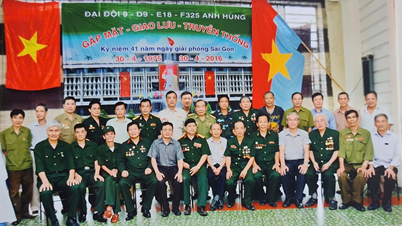



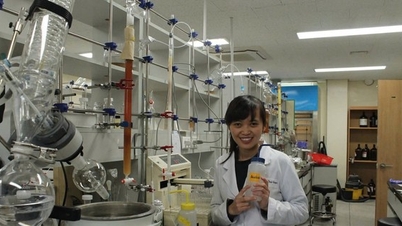






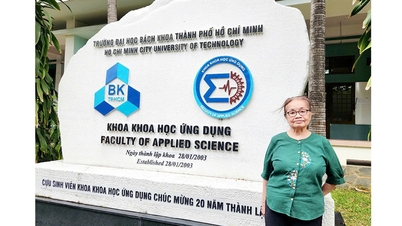



![[Photo] Binh Thuan organizes many special festivals on the occasion of April 30 and May 1](https://vphoto.vietnam.vn/thumb/1200x675/vietnam/resource/IMAGE/2025/5/1/5180af1d979642468ef6a3a9755d8d51)

![[Photo] "Lovely" moments on the 30/4 holiday](https://vphoto.vietnam.vn/thumb/1200x675/vietnam/resource/IMAGE/2025/5/1/26d5d698f36b498287397db9e2f9d16c)






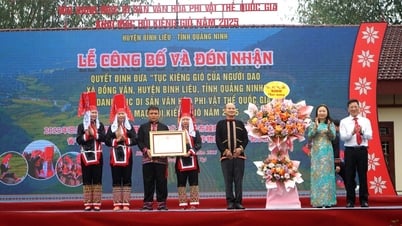







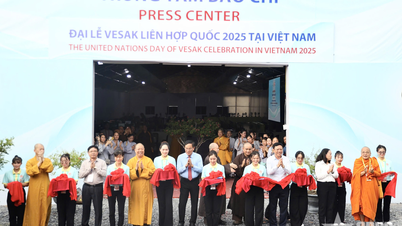















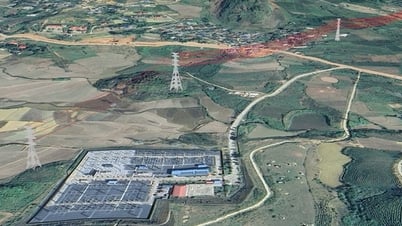
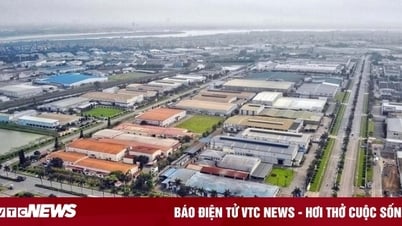
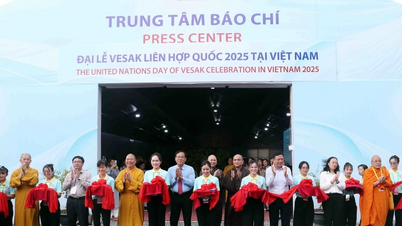


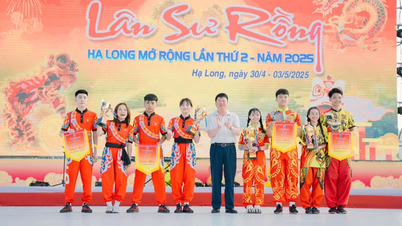

























Comment (0)